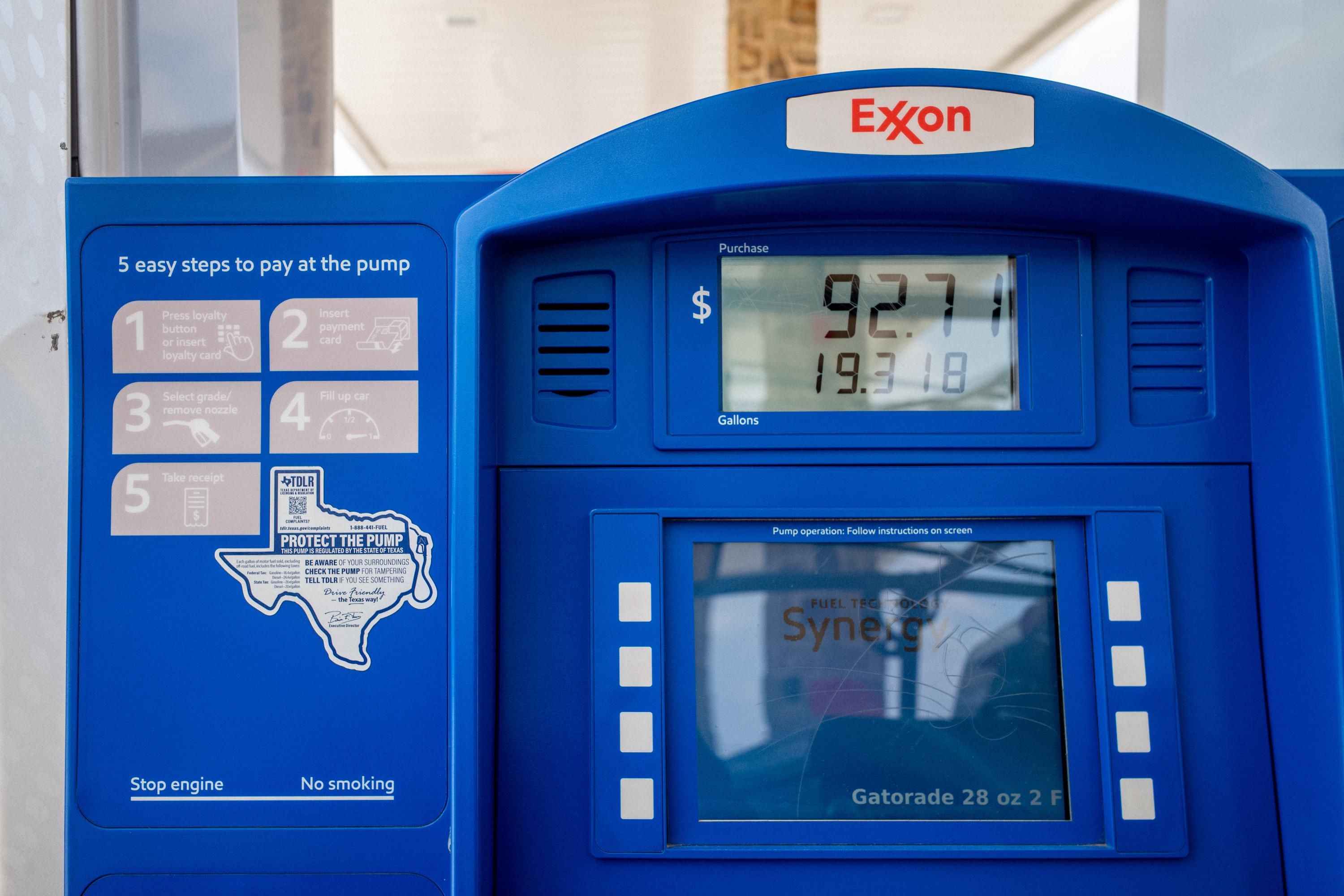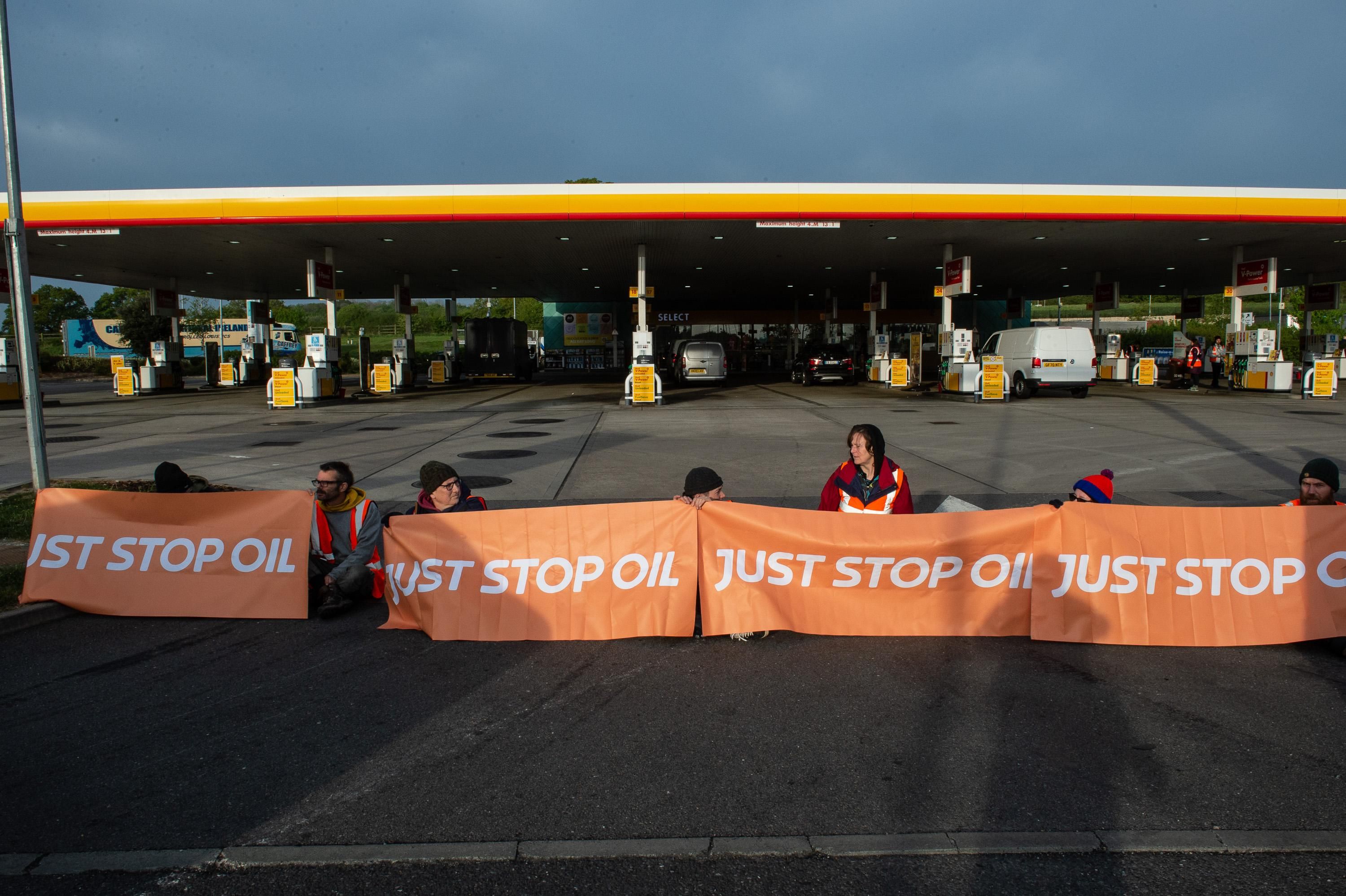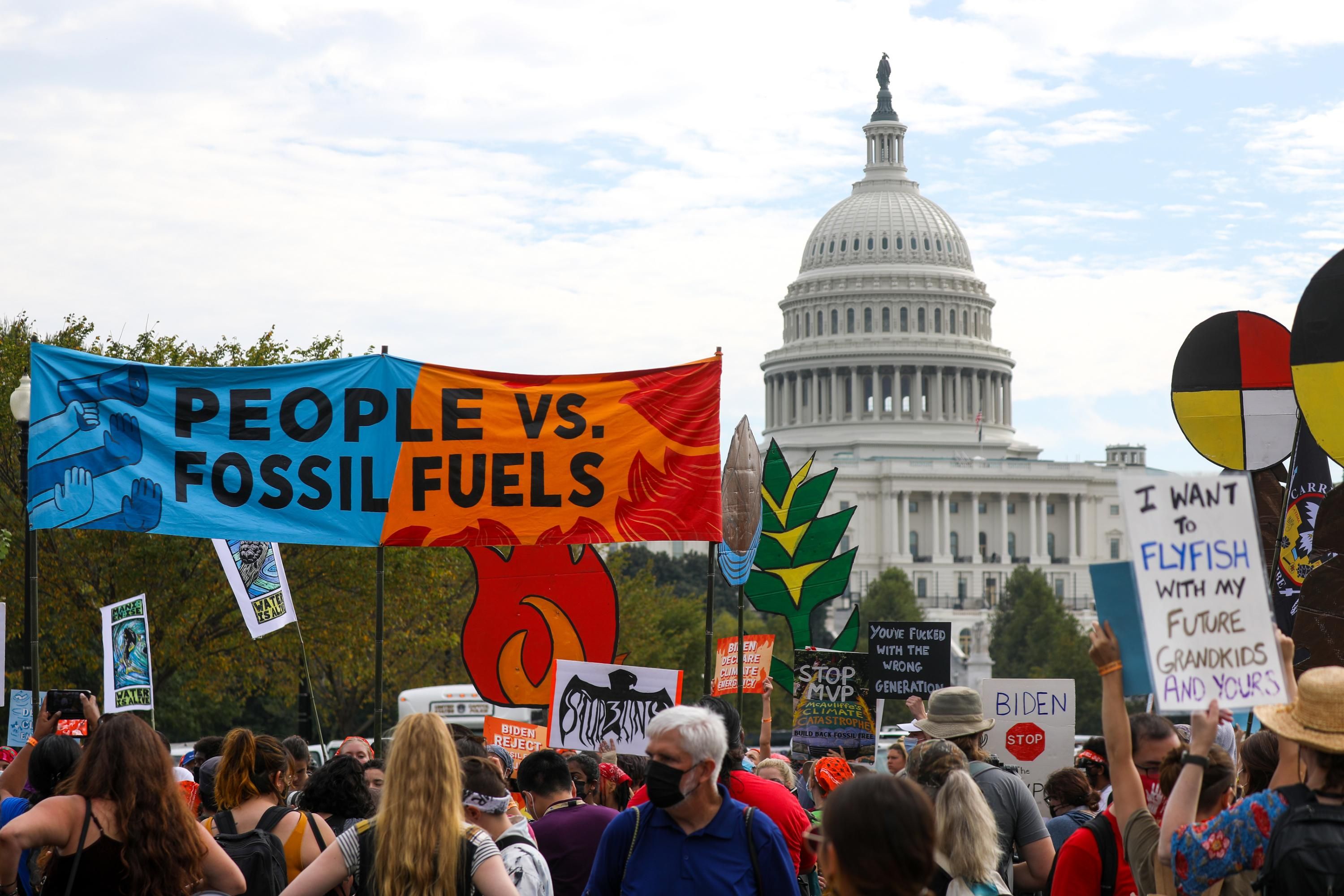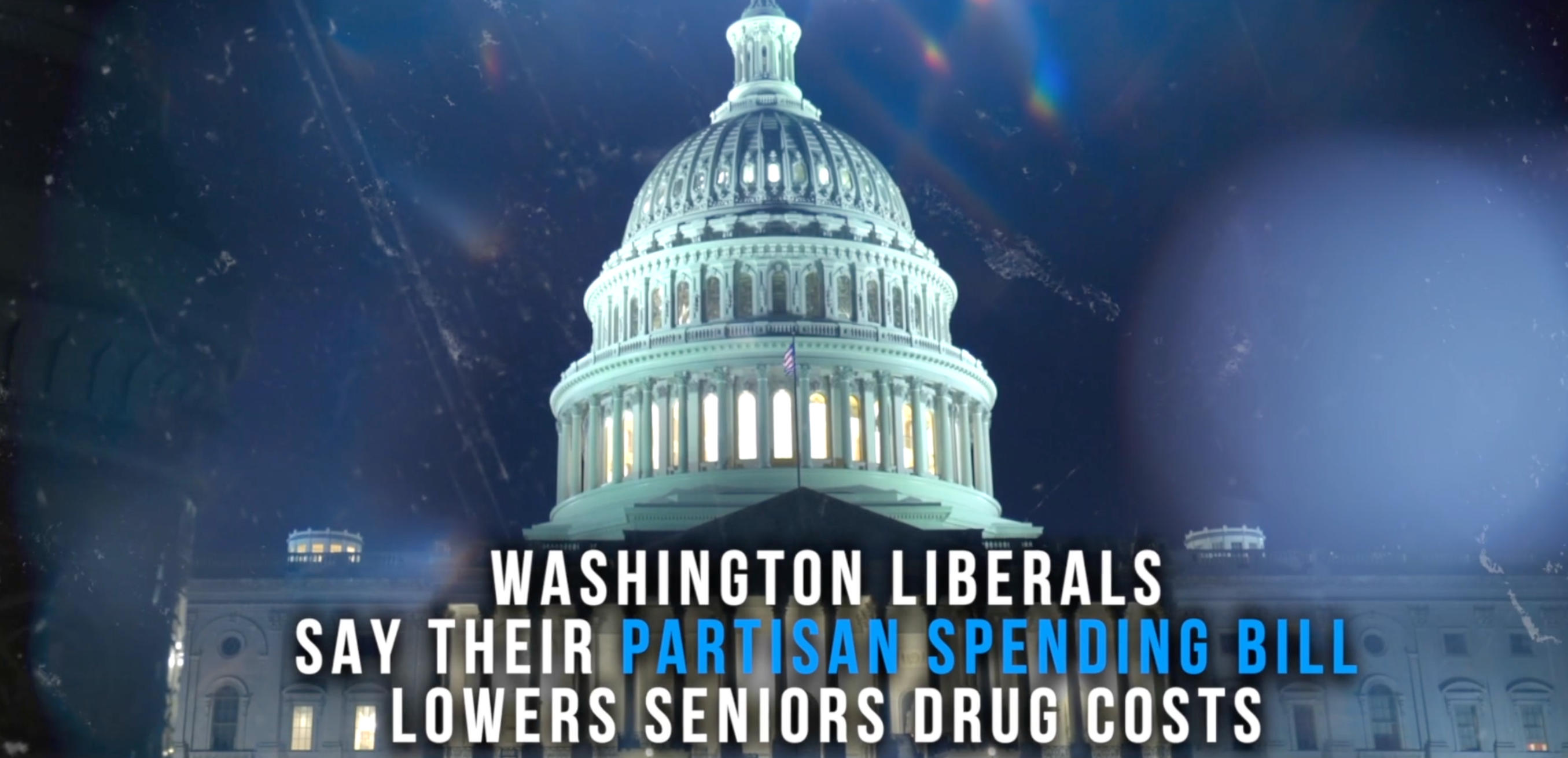"Make no mistake; these profits mark a large transfer of wealth from working- and middle-class people to wealthy oil executives and shareholders," said Jordan Schreiber of Accountable.US.

An ExxonMobil gas pumping station displays a purchase on June 9, 2022 in Houston, Texas. (Photo: Brandon Bell/Getty Images)
JESSICA CORBETT
As fossil fuel giants this week reported record profits for the second quarter, an analysis out Friday highlighted how eight oil companies have raked in nearly $52 billion over the past three months "while Americans continue to struggle at the pump."
The review by the watchdog group Accountable.US revealed that from April through June, Chevron, Equinor, ExxonMobil, Hess Corp, Phillips 66, Shell, and TechnipFMC "saw their profits skyrocket from the same time period last year, with income shooting up 235%."
The analysis also pointed out that leaders at Equinor, Halliburton, Hess Corp, and TechnipFMC have boasted "about excellent quarters while dismissing high prices for consumers."
Jordan Schreiber of Accountable.US called the companies' collective profit boost "eye-popping" but also unsurprising "after spending the past three months price gouging consumers by raising gas prices to unprecedentedly high levels."
"Make no mistake; these profits mark a large transfer of wealth from working- and middle-class people to wealthy oil executives and shareholders," she said. "While many consumers were feeling the heavy burden of a life necessity suddenly doubling in price, oil executives were keeping prices high to maximize their profits."
The Q2 profits of U.S. energy giants Chevron and Exxon—$11.62 billion and $17.85 billion, respectively—along with that of Europe's largest oil company, Shell—$11.47 billion—drew widespread criticism along with calls for action by lawmakers and President Joe Biden.
"Big Oil companies are making a killing and pouring fuel on the climate fire while communities pay for more and deadlier climate disasters. It's outrageous," said Richard Wiles, president of the Center for Climate Integrity, in a statement Friday.
"Exxon and other oil and gas corporations lobbied and lied for decades to keep the world addicted to fossil fuels, making billions while hardworking families pay for higher gas prices and costlier heatwaves, wildfires, droughts, and floods," he continued. "Now Exxon is once again using its record profits to line the pockets of executives and shareholders."
Wiles asserted that "elected officials cannot remain silent in the face of this injustice. Whether it's taxing these companies' record profits, or taking them to court to make polluters pay for climate damages they knowingly caused, it's time to stand up to Big Oil."
Public Citizen president Robert Weissman declared that "Big Oil is laughing all the way to the bank—and the joke's on us."
"We don't have to be suckers," he argued. "A windfall profits tax with rebates to taxpayers would offset the pain at the pump and end Big Oil's profiteering. Banning U.S. oil exports would actually lower prices for American consumers."
According to Weissman, "It's time for Congress and the Biden administration to stop complaining about Big Oil's rip-off and start doing something about it."
Some lawmakers agree. While Republicans "will continue to play politics and blame Biden for gas prices," Rep. Mark Pocan (D-Wis.) said of the fossil fuel giants' quarterly profits, "we need to crack down on Big Oil."
Sen. Bernie Sanders concurred, tweeting that "it's time for a windfall profits tax."
While some of his colleagues have introduced legislation focused on Big Oil, Sanders has put forth a broader tax proposal that would target price gouging by a range of companies.
Amid rising fears of recession in recent weeks, calls have been mounting for federal lawmakers to more forcefully take on corporate greed. The Inflation Reduction Act unveiled Wednesday features some related policies, but climate activists have also sounded the alarm about its energy provisions. The bill—negotiated with fossil fuel ally Sen. Joe Manchin (D-W.Va.)—contains major handouts that are reportedly "delighting" the oil and gas industry.
The fossil fuel industry has not only used its record profits to enrich shareholders; it's also dumped money into influencing officials on Capitol Hill. As Common Dreams reported exclusively on Thursday, an analysis from Climate Power shows that since last year, the sector has poured over $200 million into sabotaging climate action.
Our work is licensed under Creative Commons (CC BY-NC-ND 3.0). Feel free to republish and share widely.
Fossil fuel giants raked in billions in profits last quarter "by gouging people at the gas pump," said one campaigner. "Why on Earth are we still subsidizing Big Oil?"

Activists from Just Stop Oil block the entrance to a Shell gas station on April 28, 2022 in Cobham, England. (Photo: Guy Smallman/Getty Images)
KENNY STANCIL
Economic and climate justice advocates on Thursday reiterated their demands for far-reaching energy reforms after Europe's two biggest fossil fuel corporations reported more than $21 billion in combined second-quarter profits and announced plans to buy back a combined $8 billion in shares in the third quarter—all while continuing to receive billions in public subsidies each year to wreck the planet.
British venture Shell posted a record-breaking $11.5 billion in profits from April through June, more than doubling its Q2 earnings compared with 2021 ($5.5 billion) and surpassing the previous quarterly high of $9.1 billion set during the first three months of 2022, which was nearly triple last year's Q1 net income of $3.2 billion.
"We must phase out fossil fuels and speed up the transition to renewables in order to overhaul our energy system."
Its French rival, TotalEnergies, made $9.8 billion in profits between April and June, up from $9 billion during the first three months of 2022. Last year, the company brought in $3.5 billion and $3 billion, respectively, during Q2 and Q1.
Fossil fuel giants raked in billions in profits last quarter "by gouging people at the gas pump," Jamie Henn, a spokesperson for the Stop The Oil Profiteering campaign, wrote on social media. "Why on Earth are we still subsidizing Big Oil?"
Trillions of dollars per year in public money has helped the oil and gas sector make more than $52 trillion in profits since 1970. That sum, which amounts to $2.8 billion dollars per day for the past half-century, has enabled the fossil fuel industry to "buy every politician" and delay lifesaving climate action, Aviel Verbruggen, the author of the analysis, told The Guardian last week.
Like other firms in the sector, Shell and Total are presently cashing in on the sky-high cost of energy. Although retailers started charging more for gasoline in 2021 as consumer demand, which took a nosedive during the early stages of the Covid-19 pandemic, began to outpace supply—deliberately suppressed at the behest of investors to boost profits—price hikes at the pump have intensified since Russia invaded Ukraine in late-February.
"The hikes in prices did not disappear into a black hole," Sheffield University political economist Richard Murphy tweeted Thursday. "They went... into corporate profits, massively increasing the divisions and stresses in our society."
Big Oil is capitalizing on the war in Ukraine by jacking up prices and rewarding shareholders with massive stock buybacks. Shell bought back $8.5 billion in shares during the first half of 2022 and just announced a $6 billion stock buyback program for Q3, Reuters reported. Total, meanwhile, bought back $3 billion in stocks during the first six months of this year and has plans for another $2 billion in share buybacks in the current quarter.
Progressive activists responded with outrage to Thursday's news.
"This announcement of yet another obscene profit for Shell is a clear sign that our broken energy system is completely unfit for purpose," Freya Aitchison, an oil and gas campaigner at Friends of the Earth Scotland, said in a statement.
"Rising energy prices are a key driver of the cost of living crisis that has plunged millions of people in the U.K. into fuel poverty, yet bosses and shareholders at Shell are getting even richer by exploiting one of our most basic needs," said Aitchison.
In addition, Shell is "worsening climate breakdown and extreme weather" by moving ahead with harmful proposals, such as expanded offshore drilling in the Jackdaw gas field, that will "lock us into" decades of increased planet-heating emissions, she continued. Experts have warned repeatedly that investing in new oil and gas projects is incompatible with the Paris agreement's goal of limiting global warming to 1.5ºC.
"We must phase out fossil fuels and speed up the transition to renewables in order to overhaul our energy system and ensure that everyone has access to affordable and clean renewable energy," Aitchison stressed.
Total "is responsible for some of the most destructive fossil fuel projects on the planet, including the controversial East African Crude Oil Pipeline [EACOP] and fracking across Vaca Muerta, Argentina," 350.org noted. "It is vital that we stop the flow of money to reckless fossil fuel companies."
Thursday's announcement "shines a spotlight on the moral bankruptcy and danger posed by oil majors," the group continued. "These corporations are ruthlessly profiteering off war in Ukraine, at a time when tens of millions of people are currently suffering from the combined impacts of the climate crisis and the cost of living scandal."
"Total is currently leading a dash for gas in Africa, recently securing billion-dollar deals in Algeria and South Africa to extract and burn more fossil fuels from the continent," the group added. "Total's planned operations will be devastating for people and the planet—their actions will benefit a handful of wealthy shareholders at huge cost to local communities and the climate."
"It is appalling that Total Energies continues to rake in obscene profits at the expense of people and the planet, more so in Africa, the continent most vulnerable to climate change," said Omar Elmawi, coordinator of Stop EACOP.
The project is "facing sustained resistance locally and globally due to the threat it poses to communities and their livelihoods as well as expected negative impacts on the environment and sensitive ecosystems in Uganda and Tanzania," Elmawi added. "We can stop EACOP and the wave of destruction it is set to leave in its wake, if we stop the flow of finance to Total."
"The future the world needs is one that no longer burns fossil fuels."
Charity Migwi, Africa regional campaigner at 350.org, said that "Total makes vague promises of job creation in the oil and gas sector while it causes significant job losses in the agricultural and tourism sector."
"Total's business has no place in Africa," Migwi added. "The future the world needs is one that no longer burns fossil fuels."
Shell and Total are two of the world's five oil supermajors; the others are Exxon-Mobil, Chevron, and BP. Bloomberg reported Tuesday that these fossil fuel giants are collectively poised for a record-shattering $50 billion in Q2 profits, with Exxon alone expected to bring in up to $18 billion, potentially doubling its massive Q1 earnings.
Lawmakers in the United Kingdom approved a 25% windfall tax on oil and gas producers' profits earlier this month, but their counterparts in France and the United States have yet to take similar action.
A whopping 80% of U.S. voters—including 73% of Republicans—support the Big Oil Windfall Profits Tax introduced by congressional Democrats in March.
Dozens of progressive advocacy groups and lawmakers have been urging President Joe Biden, House Speaker Nancy Pelosi (D-Calif.), and Senate Majority Leader Chuck Schumer (D-N.Y.) to support the measure, which would redistribute an estimated $45 billion to U.S. households.
Sen. Elizabeth Warren (D-Mass.) has said the proposal can help Democrats avoid "big losses" in November's crucial midterms, but it faces long odds given the GOP's desire to exploit voters' mounting anger at the state of the economy. Not only is it unlikely that at least 10 Senate Republicans would support advancing debate on the bill, as required due to the filibuster, but it remains unclear whether right-wing Democratic Sen. Joe Manchin (W.Va.) would vote for it.
Our work is licensed under Creative Commons (CC BY-NC-ND 3.0). Feel free to republish and share widely.
Climate Power, the group behind the new analysis, said Democrats' new climate deal sends "a strong signal" that "deep pockets only go so far."

Environmentalists gather outside the U.S. Capitol in Washington, D.C. on October 15, 2021.
JAKE JOHNSON
The oil and gas industry, one of the most powerful corporate forces in American politics, has spent more than $200 million over the past year and a half to stop Congress from slashing carbon emissions as evidence of their catastrophic impact—from deadly heatwaves to massive wildfires—continues to accumulate in stunning fashion.
That topline estimate of the fossil fuel industry's lobbying outlays and congressional election spending in the U.S. was calculated by Climate Power, which provided its findings exclusively to Common Dreams.
"Democrats took their biggest step ever towards showing that politicians who protect profiteers fleecing Americans at the pump are on the wrong side of history."
Nearly 80% of the industry's campaign donations during the time period examined went to Republican candidates, according to Climate Power, whose analysis draws on data from OpenSecrets.
Until Wednesday night, when Senate Majority Leader Chuck Schumer (D-N.Y.) and Sen. Joe Manchin (D-W.Va.) announced a surprise deal on climate investments, it looked as if the industry's influence campaign had fully paid off, having helped crater the Democrats' sweeping Build Back Better package.
Earlier this month, Manchin—the leading individual recipient of oil and gas industry cash in Congress—informed the Democratic leadership that he would not support moving ahead with renewable energy spending as part of a less ambitious bill, an apparently fatal blow to the hopes of climate action this year and possibly years into the future.
Manchin, for now, appears to have reversed course, striking an agreement with Schumer that contains a historic $369 billion in climate and energy spending, including billions to speed the country's lagging transition away from fossil fuels. If accepted by all 50 members of the Senate Democratic caucus, the reconciliation bill can pass without GOP support.
Schumer, who said the measure would put the country "on a path to roughly 40% emissions reductions by 2030," announced that he expects a vote on the legislation by next week. Sen. Kyrsten Sinema (D-Ariz.), a key swing vote, has not commented on the deal.
Noreen Nielsen, a senior adviser to Climate Power, told Common Dreams that with the new framework, "a strong signal was sent that deep pockets only go so far."
"Democrats took their biggest step ever towards showing that politicians who protect profiteers fleecing Americans at the pump are on the wrong side of history," said Nielsen. "All the money in the world couldn't stand in the way of an agreement to move forward on a bold plan to ramp up American-made clean energy, lower energy bills for families, and take on climate change."
But while climate advocates welcomed the proposal overall as a potential game-changer for the environment, they also stressed that the deal is littered with the fingerprints of the oil and gas industry, which—according to Climate Power's new analysis—has spent $63.5 million on lobbying so far this year.
As part of the agreement, Democratic leaders—including Schumer and President Joe Biden—agreed to reform the regulatory process for pipelines and other fossil fuel infrastructure in the coming months, a victory for Manchin and his industry backers.
Such reforms could clear the way for the Mountain Valley Pipeline, a fracked gas project in West Virginia and Virginia that, if completed, would spew 89,526,651 metric tons of greenhouse gas emissions into the atmosphere each year.
Jamie Henn, the director of Fossil Free Media, said late Wednesday that it is "incumbent on every green group and climate activist" to "fight like hell to make sure the Mountain Valley Pipeline is never built."
"No communities should be sacrificed for political gains," Henn added.
The bill, in its current form, would also mandate oil drilling lease sales off the coast of Alaska and in the Gulf of Mexico.
Related Content
Climate Power's analysis of Big Oil lobbying and the Schumer-Manchin deal came as fossil fuel giants began reporting their profits for the second quarter of 2022.
Early Thursday, Shell announced a record-shattering $11.5 billion in profits for last quarter. ExxonMobil—which is also expected to announce a profit surge—and Chevron are set to report earnings on Friday as the industry continues to exploit Russia's assault on Ukraine to push up costs for consumers.
According to a study published last week, the global oil and gas industry has raked in nearly $3 billion in profit per day over the past five decades as it has sown disinformation about its central responsibility for the climate crisis and tanked efforts to address destructive warming.
In the words of Aviel Verbruggen, the study's lead author, those staggering profits have given the fossil fuel industry the ability to "buy every politician" and "every system."
"I think this happened," Verbruggen told The Guardian.
Our work is licensed under Creative Commons (CC BY-NC-ND 3.0). Feel free to republish and share widely.












